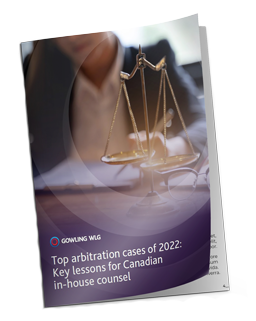Todd J. Burke
Partner
Member, International Board
Co-Leader, International Arbitration
Article
7

2022 saw the continued increase in the use of arbitration across Canada.
For parties to international contracts, the ability to enforce an arbitration award in more than 170 countries under the New York Convention is often the driving force behind the choice of arbitration to resolve disputes. For parties to domestic contracts, it is more frequently issues such as cost, procedural flexibility, confidentiality, exclusion of appeals and choice of arbitrator that leads them to prefer arbitration over domestic courts. However, the significant backlog of hearings and trials that COVID-19 caused in Canadian courts and the resulting long wait to obtain a hearing, in particular, has made arbitration an attractive alternative route for those looking to have their disputes resolved more speedily
The popularity of arbitration has inevitably led to a vast number of court decisions across Canada related to arbitration proceedings.
With a view to helping in-house counsel stay abreast of this evolving area of law, we surveyed our Arbitration Practice Group and asked our practitioners across Canada to identify the most important arbitration-related court cases of 2022. I am delighted to present the results of that survey, with practical summaries and useful analyses of those cases.
The general theme emerging from last year's cases is one of a legislative framework and a judiciary supportive of both international and domestic arbitration, with the courts generally adopting a "hands-off" approach to preliminary questions of jurisdiction and arbitrability. The courts have also largely respected the parties' agreement to arbitrate and choice of arbitrator by upholding arbitrators' decisions and rejecting disguised appeals on the merits where such appeals have been excluded by the parties.
However, perhaps this year's most important decision, Petrowest, demonstrates there is still tension between the private nature of arbitration and the broader administration of justice obligations the court and legislature owe to the public as a whole. This delicate balance is hardly unique to Canada; indeed, it's one that all arbitration-friendly countries continue to struggle with.
Moreover, the fact that a number of the cases we highlight are successful appeals indicates that there is still much uncertainty and inconsistency relating to the interpretation and application of arbitration laws across Canada. It also underscores the need for expert advice and representation to help guide users, as well as the courts, to successful outcomes.
Cruickshank v. City of Kingston
Ontario Superior Court defers "jurisdictional" objections based on limitation defence and non-adherence to pre-arbitration procedural steps to arbitral tribunal
Newtech Waste Solutions v. Asselin
Québec Superior Court again confirms that an arbitration agreement can apply to non-signatories
Air India, Ltd. v. CC/Devas (Mauritius) Ltd
Québec Court of Appeal overturns decision allowing the enforcement of an Award against a subsidiary of the debtor
Optiva v. Tbaytel
Ontario Court of Appeal upholds arbitrator's $4.39M award and validates use of summary judgment-like procedures in domestic arbitrations
Aroma Franchise v. Aroma Espresso Bar
Ontario Court confirms that once an arbitrator issues a Final Award, even a Partial Final Award, allegations of arbitrator bias under Article 34 of the Model Law are properly before the Court
Gowling WLG's Canadian Arbitration Practice Group is one of the largest and most active arbitration practices in Canada, covering all industry sectors and both domestic and international arbitration. Our services include drafting arbitration agreements, representing clients in both international and domestic arbitrations, and enforcing and challenging arbitral awards. In addition to ad hoc arbitrations, we have represented clients in institutional arbitrations under the rules of all major arbitration institutions, including the LCIA, ICC, SIAC, UNCITRAL, IDCR-AAA and ADR-IC.
The Canadian Arbitration Practice Group forms part of Gowling WLG's International Arbitration Practice Group, serving clients' needs across the globe.
NOT LEGAL ADVICE. Information made available on this website in any form is for information purposes only. It is not, and should not be taken as, legal advice. You should not rely on, or take or fail to take any action based upon this information. Never disregard professional legal advice or delay in seeking legal advice because of something you have read on this website. Gowling WLG professionals will be pleased to discuss resolutions to specific legal concerns you may have.